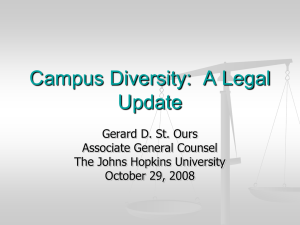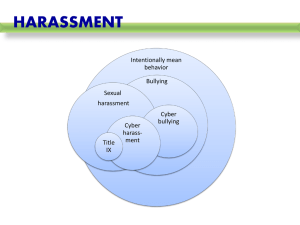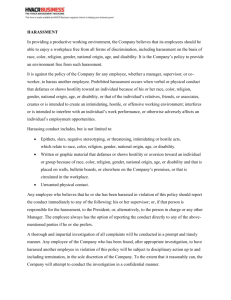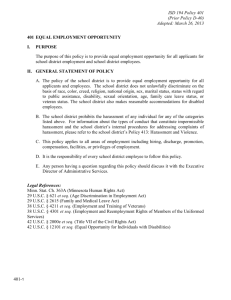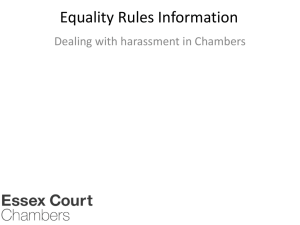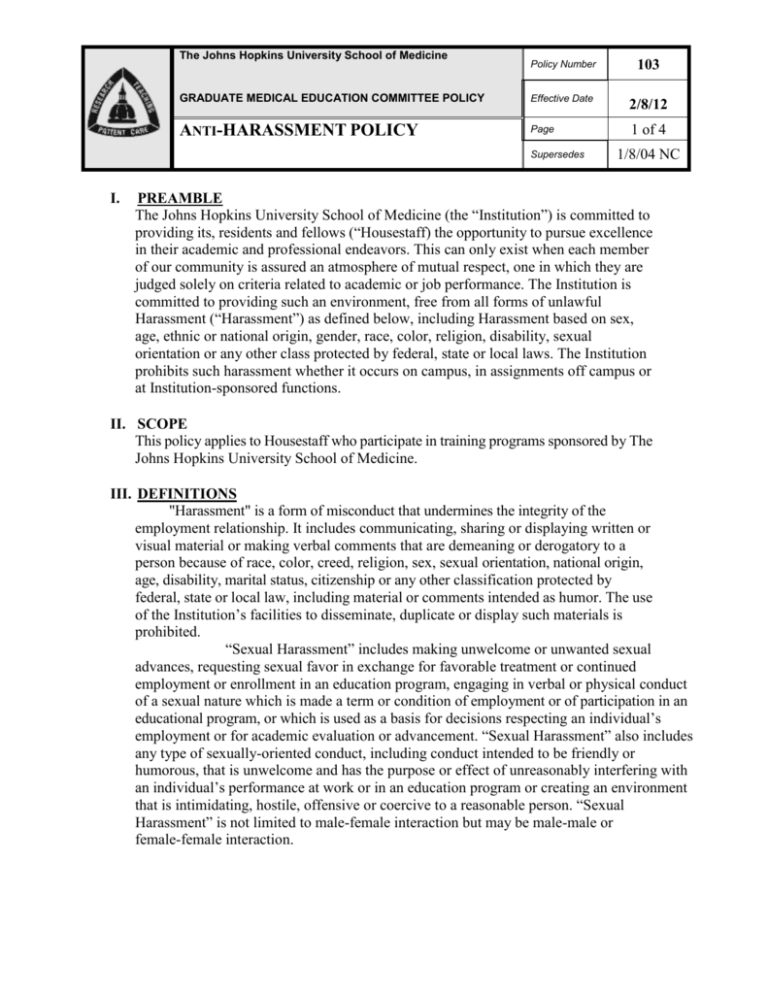
The Johns Hopkins University School of Medicine
Policy Number
103
GRADUATE MEDICAL EDUCATION COMMITTEE POLICY
Effective Date
2/8/12
ANTI-HARASSMENT POLICY
Page
1 of 4
Supersedes
I.
1/8/04 NC
PREAMBLE
The Johns Hopkins University School of Medicine (the “Institution”) is committed to
providing its, residents and fellows (“Housestaff) the opportunity to pursue excellence
in their academic and professional endeavors. This can only exist when each member
of our community is assured an atmosphere of mutual respect, one in which they are
judged solely on criteria related to academic or job performance. The Institution is
committed to providing such an environment, free from all forms of unlawful
Harassment (“Harassment”) as defined below, including Harassment based on sex,
age, ethnic or national origin, gender, race, color, religion, disability, sexual
orientation or any other class protected by federal, state or local laws. The Institution
prohibits such harassment whether it occurs on campus, in assignments off campus or
at Institution-sponsored functions.
II. SCOPE
This policy applies to Housestaff who participate in training programs sponsored by The
Johns Hopkins University School of Medicine.
III. DEFINITIONS
"Harassment" is a form of misconduct that undermines the integrity of the
employment relationship. It includes communicating, sharing or displaying written or
visual material or making verbal comments that are demeaning or derogatory to a
person because of race, color, creed, religion, sex, sexual orientation, national origin,
age, disability, marital status, citizenship or any other classification protected by
federal, state or local law, including material or comments intended as humor. The use
of the Institution’s facilities to disseminate, duplicate or display such materials is
prohibited.
“Sexual Harassment” includes making unwelcome or unwanted sexual
advances, requesting sexual favor in exchange for favorable treatment or continued
employment or enrollment in an education program, engaging in verbal or physical conduct
of a sexual nature which is made a term or condition of employment or of participation in an
educational program, or which is used as a basis for decisions respecting an individual’s
employment or for academic evaluation or advancement. “Sexual Harassment” also includes
any type of sexually-oriented conduct, including conduct intended to be friendly or
humorous, that is unwelcome and has the purpose or effect of unreasonably interfering with
an individual’s performance at work or in an education program or creating an environment
that is intimidating, hostile, offensive or coercive to a reasonable person. “Sexual
Harassment” is not limited to male-female interaction but may be male-male or
female-female interaction.
The Johns Hopkins University School of Medicine
Policy Number
103
GRADUATE MEDICAL EDUCATION COMMITTEE POLICY
Effective Date
2/8/12
ANTI-HARASSMENT POLICY
Page
2 of 4
Supersedes
IV.
1/8/04 NC
POLICY
A. Fundamental to the Institution’s purpose is the free and open exchange of ideas. It
is not, therefore, the Institution’s purpose, in promulgating this policy to inhibit
free speech or the free communication of ideas by members of the academic
community.
B. Harassment is unlawful and will not be tolerated. Any Housestaff member found
to have engaged in Harassment will be subject to severe disciplinary action, up to
and including discharge from the applicable training program.
C. All individuals associated with the Institution, including employees, faculty,
Housestaff, trainees and students are responsible for ensuring a Harassment-free
environment. Each member of the community is responsible for fostering mutual
respect, for being familiar with this policy and for refraining from conduct that
violates this policy.
D. The institution prohibits acts of reprisal against anyone involved in lodging an good
faith complaint of Harassment. Conversely, the institution considers intentionally
filing false reports of Harassment a violation of this policy. The line between
acceptable social conduct and Harassment is not always clear. For that reason, the
Institution encourages individuals who feel they are being or may have been
harassed to communicate politely, clearly and firmly to the offending party that the
conduct is unwelcome, unwanted, offensive, intimidating or embarrassing; to
explain how the offensive behavior affects the individual’s work or academic
performance; and to ask that the conduct stop.
E. If the individual is uncomfortable with making a direct approach to the offending
party or has done so, but the perceived harassment has not stopped, the individual
may use the “Procedures for Resolution of Claims of Harassment”, which is set
forth below. The Institution encourages reporting of incidents of Harassment
regardless of the identity of the alleged offender. The Institution is committed to
promptly responding to all complaints of Harassment made pursuant to this policy.
The Johns Hopkins University School of Medicine
Policy Number
103
GRADUATE MEDICAL EDUCATION COMMITTEE POLICY
Effective Date
2/8/12
ANTI-HARASSMENT POLICY
Page
3 of 4
Supersedes
1/8/04 NC
V. PROCEDURES FOR RESOLUTION OF CLAIMS OF HARASSMENT
There are several mechanisms for resolving a claim of harassment.
1. Claims of sexual harassment may be reported in compliance with The Johns
Hopkins University Sexual Harassment Prevention and Resolution Program. The
complete policy is available at http://www.jhuaa.org/shprp/index.html.
2. Claims of any form of harassment by a member of the medical staff may be
submitted as a statement of concern to the Chairman of the Medical Board of the
involved hospital to activate an investigation and possible fair hearing procedure
in accordance with the hospital’s bylaws.
3. Claims of any form of harassment may be reported to the Associate Dean for
Postgraduate Affairs or the Vice Dean for Education. A prompt investigation shall
be carried out. The investigation will be conducted in an expeditious and discrete
manner and will include an interview with the individual making the complaint and
with any witnesses. The person alleged to have committed Harassment will also be
interviewed. If it is determined that the claim has merit, the claim and a report of
the investigation will be submitted as appropriate for Institutional action. If the
alleged harasser is a member of the faculty, the Dean shall be notified; if the
alleged harasser is an employee or contractee of The Johns Hopkins University, the
University’s Human Resources Office shall be notified. If the alleged harasser is an
employee or contractee of an affiliated hospital or institution, the appropriate officer
of that institution shall be notified.
VI.
CONFIDENTIALITY
VII.
The name of the individual making the report of Harassment will be disclosed only to the
extent necessary to conduct an investigation. However, absolute confidentiality cannot be
guaranteed
.
DISCIPLINE
All employees, including Chiefs, Administrators, Directors and other management staff,
will be subject to severe disciplinary action up to and including discharge for any
Harassment or for retaliation for any individual’s pursuit of a Harassment complaint in
accordance with this Policy.
The Johns Hopkins University School of Medicine
Policy Number
103
GRADUATE MEDICAL EDUCATION COMMITTEE POLICY
Effective Date
2/8/12
ANTI-HARASSMENT POLICY
Page
4 of 4
Supersedes
1/8/04 NC
VIII. CONTROL
The Designated Institutional Official shall assure conformance with the policy and
shall establish such other policies or procedures necessary to effectuate its intent. This
includes, but is not limited to, dissemination of this policy during new Housestaff
orientation, training for all supervisory staff on the policy and how to maintain a work
environment free of Harassment and communicating this policy to all non-employed
medical staff, vendors, contractors and other business visitors interacting with
Institution staff.
The Vice Dean of Education and Designated Institutional Official shall notify the legal
counsel of Harassment complaints for insurance reporting purposes.



